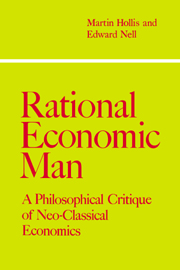Book contents
- Frontmatter
- Contents
- Preface
- Introduction
- 1 Relevance and falsification
- 2 Rational economic man
- 3 Theory and hypothesis
- 4 Facts and theories
- 5 Behaviour and prediction
- 6 A priori knowledge
- 7 Deductive explanation
- 8 The assumptions of neo-Classicism
- 9 Rationalist foundations for economic theory
- Bibliography
- Index
8 - The assumptions of neo-Classicism
Published online by Cambridge University Press: 12 October 2009
- Frontmatter
- Contents
- Preface
- Introduction
- 1 Relevance and falsification
- 2 Rational economic man
- 3 Theory and hypothesis
- 4 Facts and theories
- 5 Behaviour and prediction
- 6 A priori knowledge
- 7 Deductive explanation
- 8 The assumptions of neo-Classicism
- 9 Rationalist foundations for economic theory
- Bibliography
- Index
Summary
We have been claiming that the variables of an economic theory are applicable in principle only to a social system which can produce and sustain appropriate bearers for them. Where the bearers are institutional agents, such as households and firms, whose activities and support use materials and energy, a production model has to be presented and solved, to demonstrate that there can be such bearers within the system; and so we sketched a simple production model of Classical-Marxian form. In this chapter and the next, we shall develop the point and shall elaborate our concept of a production model. We shall also present our fundamental arguments against neo-Classicism in a more detailed and systematic way than hitherto, starting from some matters raised at the end of the Introduction. Our contention will be that many significant differences between the neo-Classical and Classical-Marxian viewpoints spring from contrasting assumptions about the bearers of the respective variables. Because of its assumptions, neo-Classicism rules out important questions and propositions a priori. We would not object to this, since we ourselves have no inhibitions about theorising a priori, were it not that we believe these excluded propositions to be true, as we shall illustrate with an heretical example, a kind of Gresham's Law transplanted from the money to the product markets. The example may suggest that the issues are empirical. But we shall contend emphatically that they are, at the deepest level, conceptual, even though, in accord with our view of the relation of concepts to facts, we shall explore the assumptions about bearers of the relevant variables with reference to the way in which the system supports the bearers.
- Type
- Chapter
- Information
- Rational Economic Man , pp. 205 - 232Publisher: Cambridge University PressPrint publication year: 1975



